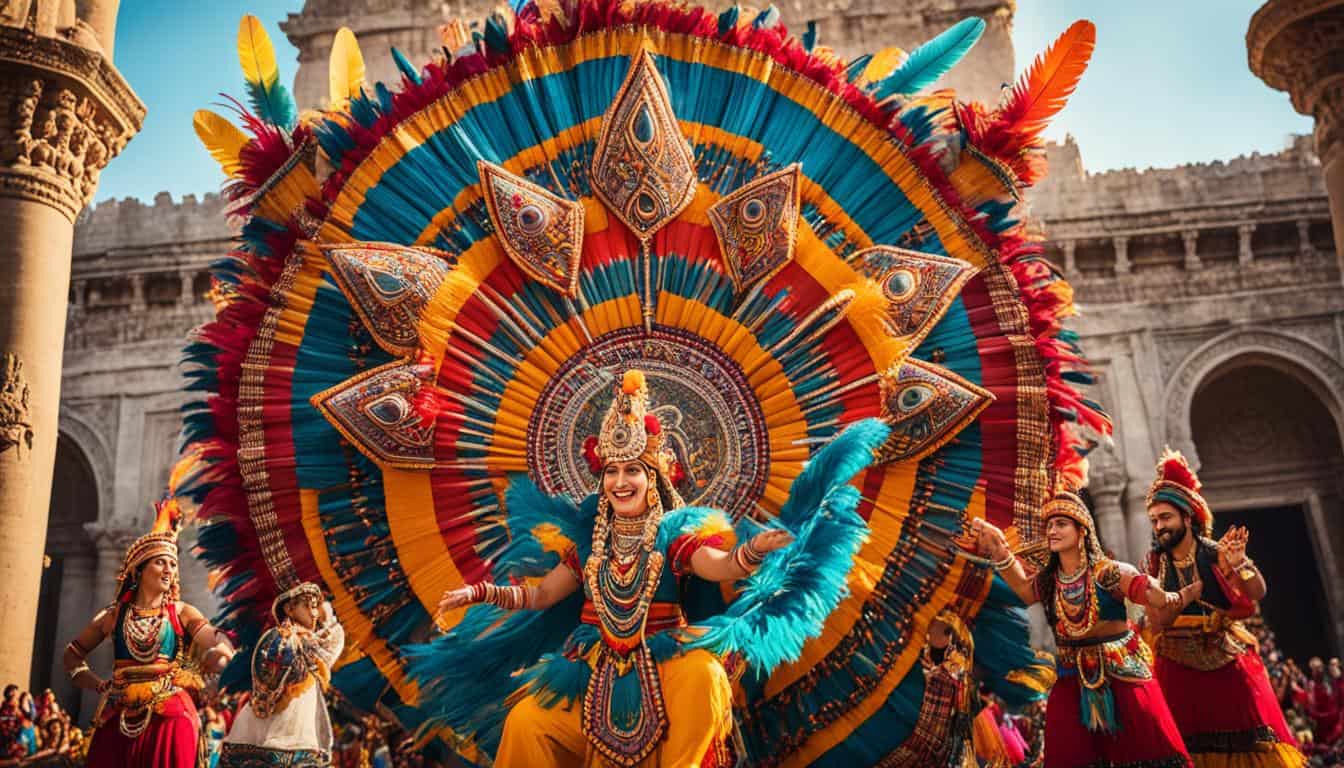Table of Contents
Did you ever wonder how foreign cultures clash with Bible teachings? It’s interesting to see the conflicts. Different religious practices facing off against the Bible have a deep impact. They changed how people worshiped greatly.
We will explore six key moments of clash in this article. These stories will challenge what you might think. They show how cultures and religions meet and sometimes disagree.
Learning about these clashes helps us understand religion better. This journey into history and culture is exciting. Are you ready to learn about these fascinating moments? Let’s start our exploration!
Dietary Laws vs. Egyptian Customs (Exodus 8:21-23)
The Israelites were leaving Egypt on God’s orders. They had to follow certain dietary rules set by God as they left. These rules put them at odds with the Egyptians’ eating habits. The Egyptians saw some animals the Israelites avoided as sacred. This created a conflict between the two groups.
Moses asked Pharaoh to let the Israelites go. He did this by calling on God to send a swarm of flies. In Egyptian culture, flies were seen as symbols of rebirth and protection. So, using flies as a tool for punishment was a direct challenge to Egyptian religious beliefs.
Moreover, what the Israelites ate was very different from the Egyptians. For example, the Israelites did not eat pork. At the same time, the Egyptians considered pigs sacred and even worshipped Hathor, the pig goddess. This difference in diet further strained their relationship with Egyptian customs.
“And if Pharaoh will not let them go, behold, I will smite all thy borders with frogs: And the river shall bring forth frogs abundantly, which shall go up and come into thine house, and into thy bedchamber, and upon thy bed, and into the house of thy servants, and upon thy people, and into thine ovens, and into thy kneadingtroughs: And the frogs shall come up both on thee, and upon thy people, and upon all thy servants.” – Exodus 8:21-23
This struggle sheds light on the Israelites’ hardship as they sought freedom. The clash between their religious customs and Egyptian practices was a major challenge. It influenced Israelite customs and practices for years to come.
Golden Calf vs. Mesopotamian Deities (Exodus 32)
When Moses went up Mount Sinai to get the Ten Commandments, the Israelites got worried. They wanted a god they could see. So, they made a Golden Calf to worship, just like the idol worship in Mesopotamian cultures.
This shows the fight between the Israelites’ belief in one God and the many gods of Mesopotamian deities. The Ancient Mesopotamians believed in many gods and goddesses. Each one was for different parts of life and nature.
The Israelites made the Golden Calf because they wanted a god they could touch. This was similar to their neighbors’ idol worship.
To truly grasp this challenge, let’s look into the Mesopotamian gods and the importance of idol worship for them:
| Mesopotamian Deities | Roles and Worship |
|---|---|
| Inanna | She was the goddess of love, beauty, and fertile lands. People worshiped her in special rituals, like temple prostitution. |
| Marduk | He was the top god of Babylon. People respected him for his power and leadership. |
| Enki | Known as the god of wisdom, crafts, and water. He was linked to life-growing and brought blessings of clean water. |
These deities show the variety of gods in Ancient Mesopotamia. They also highlight how idol worship was key to reaching out to these gods and getting their favor.
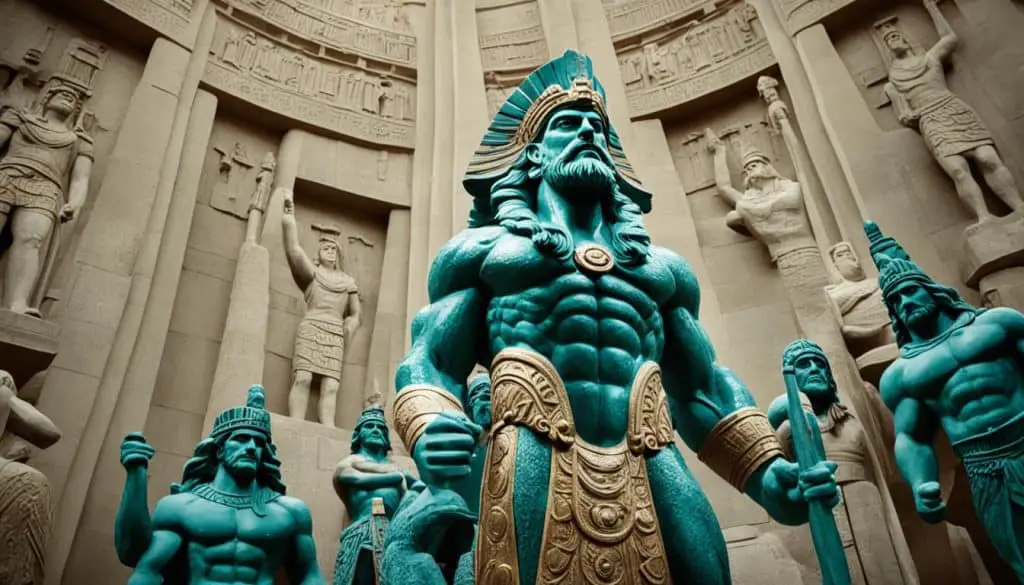
Comparing the calf idol to their agreement with the one true God, the Golden Calf story is a strong lesson. It teaches the Israelites the value of staying true to one God. It showcases the unique faith they have in a single divine being.
Child Sacrifice vs. Canaanite Practices (Leviticus 18:21, 2 Kings 17:17)
Child sacrifice was banned in the Bible, as we see in Leviticus 18:21. But the Canaanites, who lived nearby, often practiced it. They believed it pleased their gods. This caused a big conflict for the Israelites, who followed the Bible’s teaching.
The Bible’s rule against child sacrifice shows the Israelites’ strong moral compass. It shows they valued life a lot. They rejected the Canaanites’ belief that child sacrifice could make their gods happy.
“You shall not give any of your children to offer them to Molech, and so profane the name of your God: I am the LORD.” – Leviticus 18:21
The Bible clearly said the Israelites should not sacrifice their children. This was a call to faithfulness to their God. They were not to follow the Canaanites in this.
The Canaanite ways influenced the Israelites over time. 2 Kings 17:17 tells us the Israelites gave in to these customs, which included child sacrifice. This turned out very badly for them.
They sacrificed their sons and their daughters to the demons; they poured out innocent blood, the blood of their sons and daughters, whom they sacrificed to the idols of Canaan, and the land was polluted with blood.” – 2 Kings 17:17
This was a clear warning to the Israelites. It reminded them of the dangers of leaving their faith.
The Reality of Canaanite Practices
To understand the seriousness of the issue, we must look at how common child sacrifice was among the Canaanites. Historians found proof that sacrificing children was a part of Canaanite culture, especially in times of trouble.
The Canaanites believed that by offering a child, they could get help from their gods. On the other hand, the Israelites were commanded to follow their God without such sacrifices. They were told not to join in the Canaanites’ rituals.
The Consequences of Clashing Practices
The Israelites faced a tough choice: to follow their neighbors’ ways or their God’s laws. This choice tested their faith greatly.
Some Israelites did adopt the Canaanite customs, but the Bible praises those who stayed faithful. It points out the value of keeping their beliefs strong. This loyalty helped them keep a unique religious identity.
The Bible’s stance against child sacrifice teaches believers about moral values. It encourages them to stand firm in their faith, even when it’s hard. These stories show the importance of staying true to what you believe.
Ancestral Worship vs. Focus on Yahweh (Deuteronomy 18:10-12)
In many parts of the world, people once worshiped their ancestors. This was a key part of their religious life. But, as per what the Bible says in Deuteronomy 18:10-12, contacting the dead is a big no.
Seeking the future through magic, astrology, or signs is divination. In ancient times, this was how many folks made important choices or looked ahead.
Then there’s necromancy, which is speaking with dead spirits. It was a major thing for some ancient groups. They believed their ancestors’ spirits could offer advice or protection.
But, you won’t find the Bible supporting these ideas. In Deuteronomy 18:10-12, it directly warns against them. It says they are wrong in God’s eyes.
“There shall not be found among you anyone who practices divination, or tells fortunes, or interprets omens, or a sorcerer or a charmer or a medium or a necromancer, for whoever does these things is an abomination to the LORD.”
This clash of beliefs highlights Israelites’ devotion to Yahweh alone. By saying no to divination and necromancy, the Bible points towards direct worship of God. It’s all about following His laws.
The Bible’s stance on ancestor worship pushed the Israelites to stand out. It made them set aside the customs and beliefs of their surrounding nations.
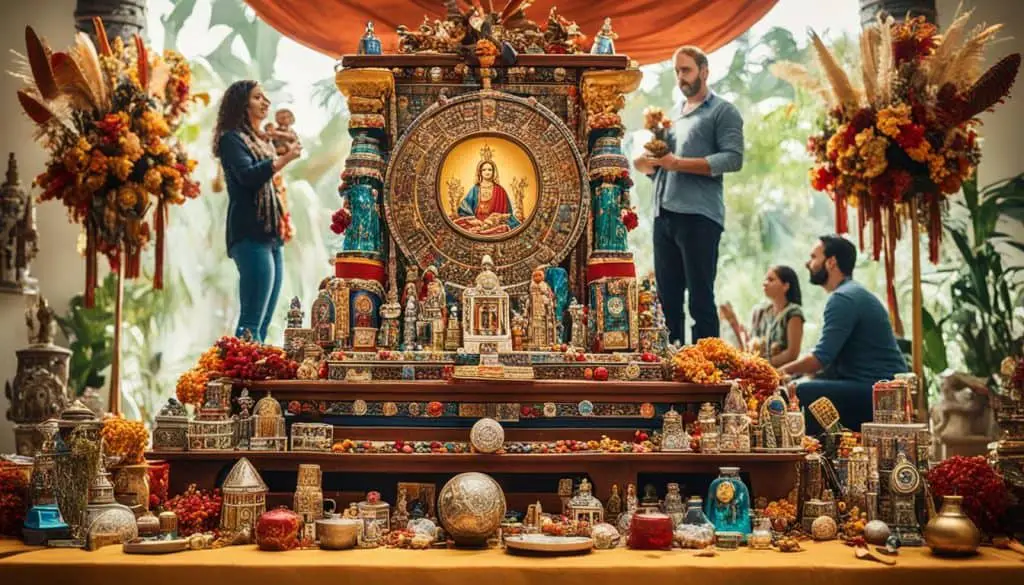
| Contrast between Ancestral Worship and Biblical Teachings | |
|---|---|
| Ancestral Worship | Biblical Teachings |
| Divination | Divination is practiced to seek knowledge or guidance from supernatural forces or spirits. |
| Necromancy | Necromancy involves summoning or communicating with the spirits of the deceased. |
Polytheism vs. The One God (1 Kings 18)
Imagine the story of Elijah and the Prophets of Baal in 1 Kings 18. It’s a tale that clearly shows the difference between believing in many gods versus a single God. On Mount Carmel, we see Elijah challenge the followers of Baal in a stunning face-off.
The Phoenicians followed many gods, with Baal as a key figure. They thought of him as the bringer of life, controlling the weather and fertility. The people worshiped various gods, seeing them in all parts of life and nature.
On the other hand, the Israelites believed in Yahweh alone. Theirs was a singular faith, focusing on a single deity. This marked a turning point where Elijah put both beliefs to the test, calling for a competition to decide the true God.
Below, there’s a table that shows the stark differences between the two beliefs. It contrasts how the Phoenicians worshipped and what the Israelites held true.
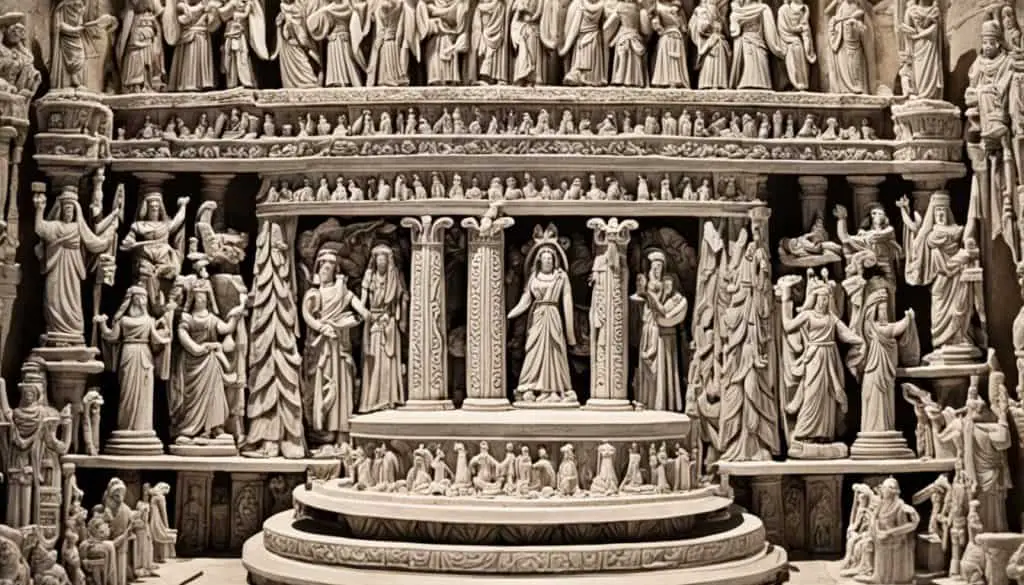
| Phoenicians (Polytheism) | Israelites (One God) |
|---|---|
| Believed in a pantheon of gods | Believed in the existence of one true God, Yahweh |
| Worshipped Baal as a powerful deity | Devoted themselves to Yahweh |
| Sacrificial rituals to please various gods | Expressed faithfulness through obedience to Yahweh’s commandments |
| Dependent on rain and natural forces for agricultural prosperity | Put their trust in Yahweh for provision and blessings |
| Outcome: The prophets of Baal failed to summon fire from their deity | Outcome: Yahweh sent fire from heaven, demonstrating His power and authority |
This exciting tale is about Elijah’s strong belief in Yahweh. He shows the deep divide between the two religious viewpoints. His actions shed light on why faith in one God stands out from believing in many.
Eventually, through Elijah’s bold action, Yahweh’s might is made clear. This event wasn’t just a win for the Israelites. It marked a crucial moment highlighting the one God’s power over all.
Be ready for the next part. We’ll dive into another key religious event that shapes important teachings.
Food Offered to Idols vs. Dietary Purity (1 Corinthians 8-10)
In the New Testament, there’s a discussion in 1 Corinthians chapters 8-10. It’s about eating food that was once given to idols. Corinth was deeply into the Greco-Roman culture, where many deities were worshipped. Their customs included offering food to these gods. This made it hard for Christians to stick to their own rules about food and faith.
The people of Corinth would eat meat sacrificed to idols at events. This was a problem for early Christians. They wanted to keep their food choices pure because of their belief in Jesus.
Paul, writing to the Corinthians, talks about the issue. He says there’s only one real God and idols are nothing. Food offered to them is like any other food. Yet, he warns about the spiritual effect it may have on others.
“Be careful that exercising your freedom doesn’t hurt others. If someone sees you do things they think are wrong, they might copy you. This could lead them to do things against their own beliefs.”
1 Corinthians 8:9
Paul tells Christians to avoid eating this food if it might make others doubt or worry. He says it’s more important to look out for the spiritual health of the community than to use their own freedom.
To make his point, Paul mentions the Old Testament. He compares the situation to when the Israelites had to stay separate from their neighbors. Similarly, Christians should stand out for their faith, not blend in with cultural practices.
“So whether you eat or drink or whatever you do, do it all to honor God. Don’t ruin things for others, whether they are Jews, Greeks, or part of God’s church. I try to help everyone in every way that I can. I don’t do what is best for me but what is best for many. I do this so they might be saved.”
1 Corinthians 10:31-33
This part shows the challenge early Christians faced. They had to choose between their culture’s practices and their faith. Paul stresses the importance of glorifying God and looking out for others.
The debate over food and religious purity in Corinth shows how early Christians balanced their faith in a diverse culture.
Comparison of Food Practices in Corinthian Culture
| Food Practices | Corinthian Culture | Christian Dietary Purity |
|---|---|---|
| Consuming Food Offered to Idols | Common practice in feasts and gatherings | Caused conflict and dilemma |
| Idol Worship | Part of religious rituals | Considered idolatrous and to be avoided |
| Consideration for Fellow Believers | Secondary concern | Emphasized importance of love and not causing stumbling |
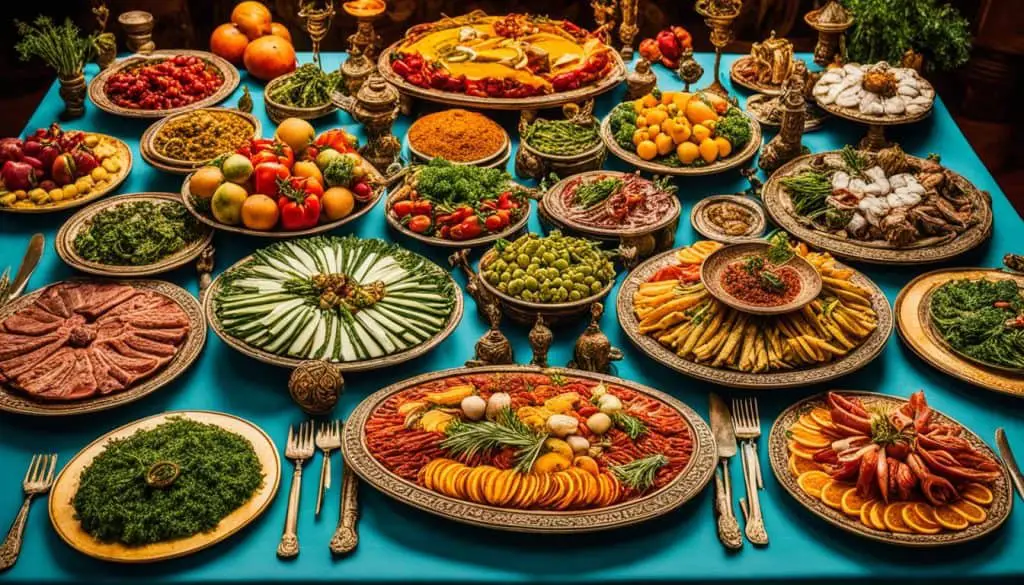
This image offers a look at how food was offered to idols in Corinth. It reminds us of the difficulties early Christians had. They had to wisely consider their interactions with the culture around them.
Conclusion
The mix of foreign cultures and Bible teachings has deeply affected religious acts over time. For example, the Israelites’ dietary laws did not match the Egyptian customs. Also, the Bible’s stand against worshipping idols differed greatly from Mesopotamian practices.
Another key point is the Bible’s total ban on child sacrifice, not in line with some cultures nearby. There was also a clear line drawn against worshiping ancestors. The clash between believing in one God versus many gods, shown in Elijah’s story, is a major struggle.
The New Testament highlights a hard issue: Corinthians eating food offered to idols. This shows the challenge of merging various cultures within religion. It stresses the ongoing battle to stay true to Biblical teachings against culture.

